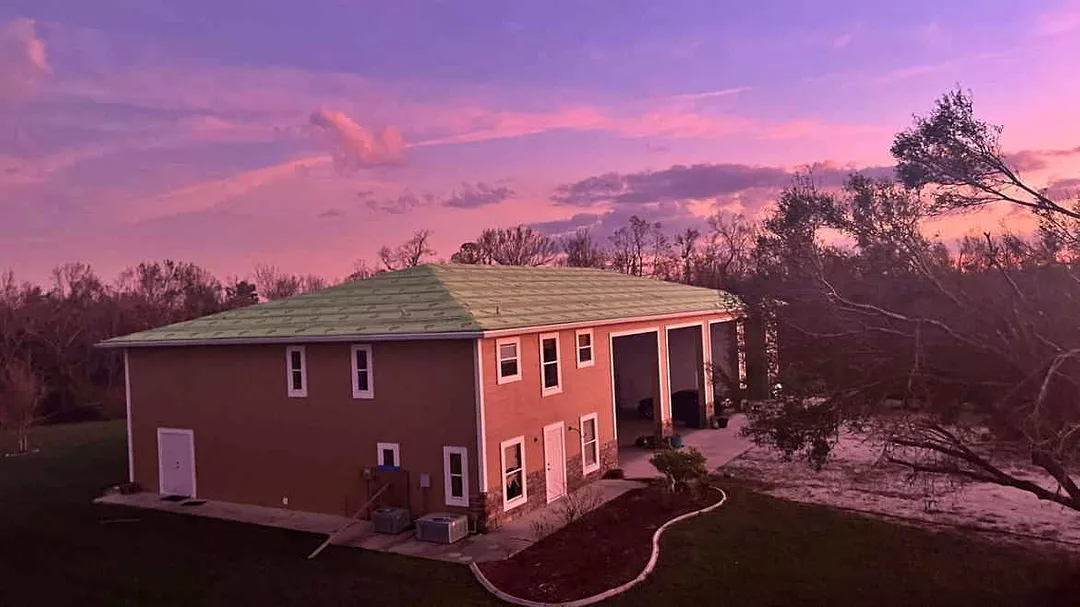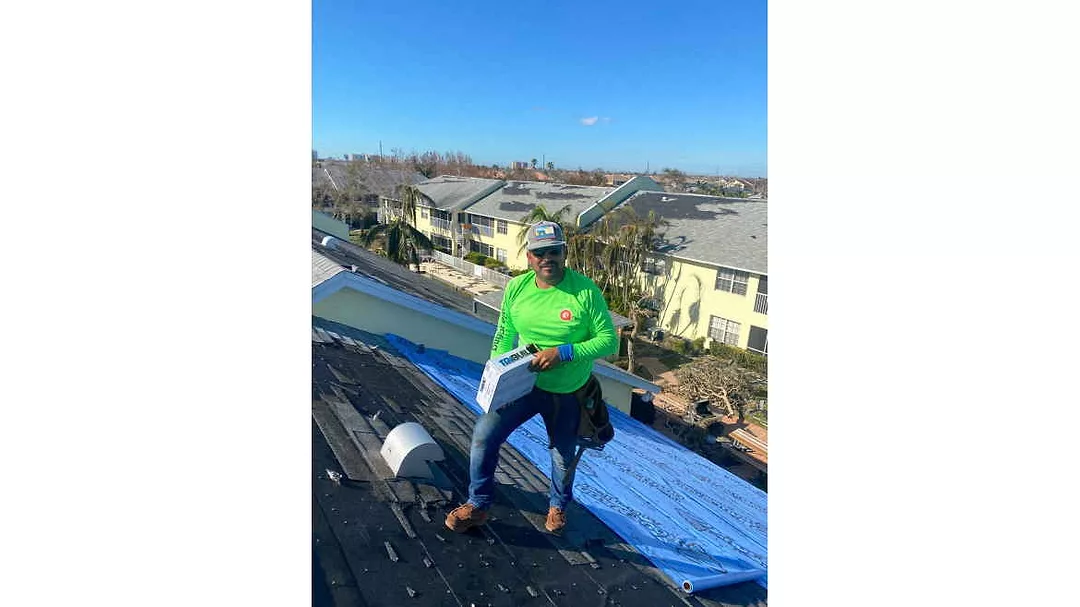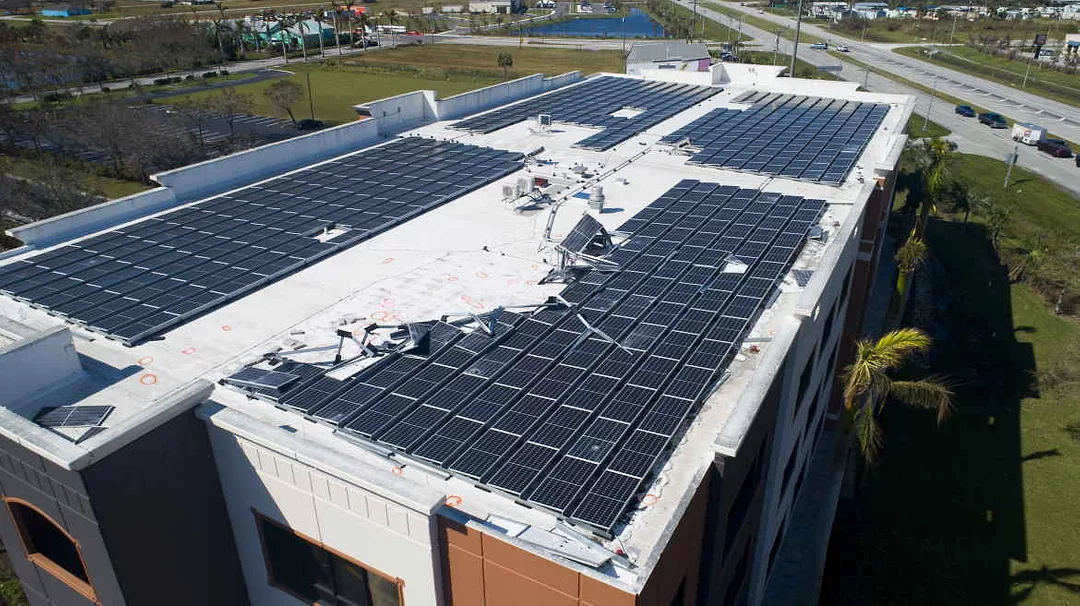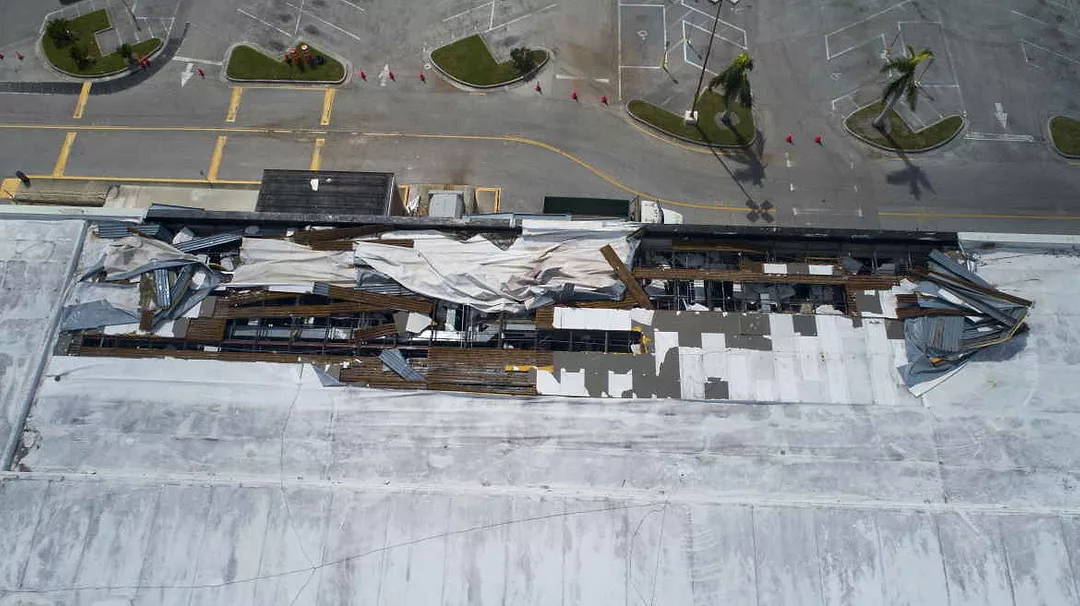Roofing Contractors Share Conditions of Rebuilding Florida After Hurricane Ian

Roofing contractors both in Florida and around the nation have come to the Sunshine State to help rebuild after the devastation caused by Hurricane Ian. Photo: Apple Roofing.

Roofing contractors with Apple Roofing caravanned to Florida to help residents with emergency repairs and plan to work in the area for the next three years. Photo: Apple Roofing.

Advanced Roofing Inc. is helping customers with solar, like Mercola Market, to repair their systems after Hurricane Ian. Photo: Advanced Roofing Inc.

Commercial roofing contractors like Advanced Roofing Inc. in Florida are assessing the damage from Hurricane Ian and making emergency repairs. Photo: Advanced Roofing Inc.
The destruction caused by Hurricane Ian, which made landfall as a Category 4 on Sept. 28, resulted in the loss of at least 100 lives and roughly $50 billion in insured losses. Around 202,000 homes and businesses were still without power on Thursday as several communities faced the tough task of rebuilding.
Roofing contractors, both native to Florida and around the country, have heeded the call to help survivors as the state begins the years-long road to recovery.
“We’re setting up for a two-year haul. We’ll probably end up doing 1,500 roofs,” said Jonathan Dorosh, CEO of Nationwide Construction Ventures in Orlando, Fla. “We don’t promise good timelines right now, it would be completely unreasonable to do so.”
Reports state record-setting storm surge combined with rain and extreme winds slammed Florida before the hurricane moved north toward South Carolina. President Joe Biden met with Florida Gov. Rick DeSantis on Wednesday to assess the damage and put aside political differences to promote unity among state and federal entities to bolster the recovery effort.
Assistance has been slow-going due to many roadways being flooded or blocked. Some, like the only bridge connecting Sanibel Island to the mainland, suffered major structural damage, cutting off residents from aid. Dorosh said his crews were driving through two to three feet of standing water on Monday to get to people and their homes. Downed cell towers made communication all but impossible, so they resorted to using walkie-talkies over short distances.
Hurricane Ian Cleanup: Out-of-State Contractors Beware
Hurricane Ian caused billions of dollars in damage to homes, buildings and more. Roofing contractors heading to Florida to help rebuild should be aware of the complexity and enforcement of Florida’s licensing laws. Trent Cotney of Adams and Reese digs into the details in this column.
“I have a team of about 40 people down here right now, but the problem is every time I move them past the line, they couldn’t communicate anymore,” he said. “I’ve got the vehicles, I’ve got the trailers, getting them where they need to be and making sure they have cell service and working power is the problem."
Marcus Kuhlmann, co-founder of Apple Roofing, said his company has sent down roughly 80 consultants and 200 crew members to help. Apple Roofing, formed by multiple roofing companies merging together, has sent people from as far as Minnesota, Arizona and Colorado. They anticipate being in the area for the next three years.
“Right now it’s all about protecting people’s homes and shelters and mitigating damage,” Kuhlmann said. “There’s hundreds of thousands of homes that have had shingles blow off, or tile or metal roofs or TPO.”
On the commercial side, Advanced Roofing Inc. in Fort Lauderdale, Fla. is doing what it can to help customers stay dry. Rob Kornahrens, CEO of Advanced Roofing, flew over areas of Fort Myers and Sarasota to view the damage. Having worked on hurricanes since Hurricane Hugo in 1989, he said the damage wasn’t as bad as expected since the storm moved instead of lingering.
“The big damage is going to be water, and flood insurance is different than wind insurance. I’m hoping we don’t get that bad headache hangover from reinsurance on the wind,” Kornahrens said. “Florida is such a bad state for insurance, this thing could tip the scale the wrong way.”
Insurance and Supply Woes
Along with the literal storm that slammed Florida, the state will likely be hit by the ongoing turmoil caused by its property insurance market. The insurance landscape was already in crisis mode prior to Hurricane Ian, with the Florida Office of Insurance Regulation putting 27 companies on a watch list to monitor their financial stability.
Legislators and industry analysts say property insurance reforms signed into law in May are aimed at stabilizing the market, claiming widespread roofing scams and the litigation involved with them are driving up prices. Even so, insurance prices aren’t expected to drop anytime soon, and may rise even more due to Ian.
“With all of the recent publicity surrounding Florida’s insurance companies to roofing contractors’ relationships, Tadlock Roofing is doing its part to ensure homeowners can count on a local, trusted company to help them with their needs,” said Jason Bellflower, corporate operations manager of Tadlock Roofing. “There is a long road ahead for these many communities, and Tadlock Roofing is committed to serving them as long as it takes while making a difference along the way.”
Kuhlmann said insurance issues are causing problems, as some people simply don’t have insurance or have massive deductibles to consider.
“It turns into different situations – maybe a tile blew off a roof and they’re not going to turn in a claim, they’re just going to pay to have it fixed, so we do that,” he said. “I’ve showed up at houses and they say, ‘No, we’re waiting for my insurance,’ and I’m like, ‘You know you have decking facing the sky, right?’”
Last year’s storm season caused supply chain issues throughout the country to worsen. The roofing industry is already bracing for similar scenarios and price increases due to Ian. Dorosh said major manufacturers have contacted him to provide their support in terms of roofing materials, but he is keeping his expectations in check.
“As far a supply issues go, they’re going to run out, everybody is going to run out at some point, but I think they’re being really proactive right now in getting the materials down to where they need to be,” Dorosh said.
Kornahrens said his company brought in thousands of squares of TPO and plenty of fasteners, and is working with RoofConnect members for additional labor, so he isn’t as concerned. However, he isn’t expecting to take on large projects due to an extensive backlog.
“We’re really not looking to jump on any storm damage that needs a permanent roof,” he said. “We’ll only go in and to temporary roofs … until they can write us back and get permanent roof put on.”
Kuhlmann said regardless of the supply or insurance situations, Apple Roofing is on the scene to help, going so far as to tell its consultants to worry about helping people rather than making money.
“It’s truly amazing to see the world react — the amount of service vehicles I saw was pretty impressive,” Kuhlmann said. “I get it, people make money doing this, but the other part is willingness and the amount of people that are just willing to come down here and help is pretty awesome.”
Looking for a reprint of this article?
From high-res PDFs to custom plaques, order your copy today!







